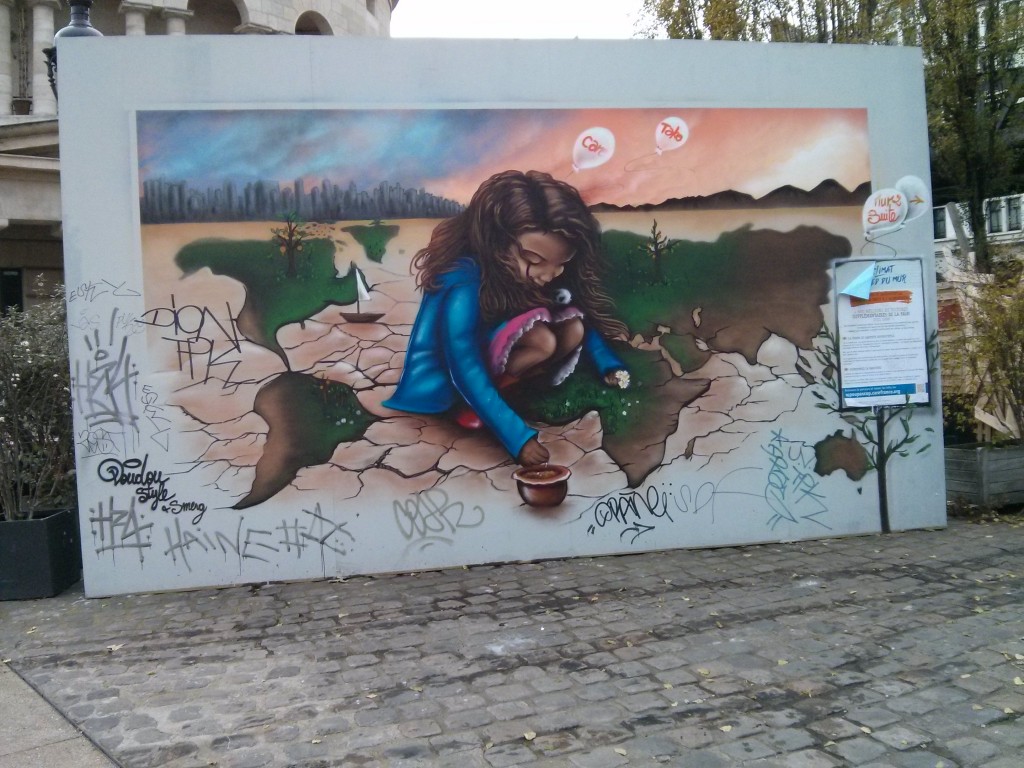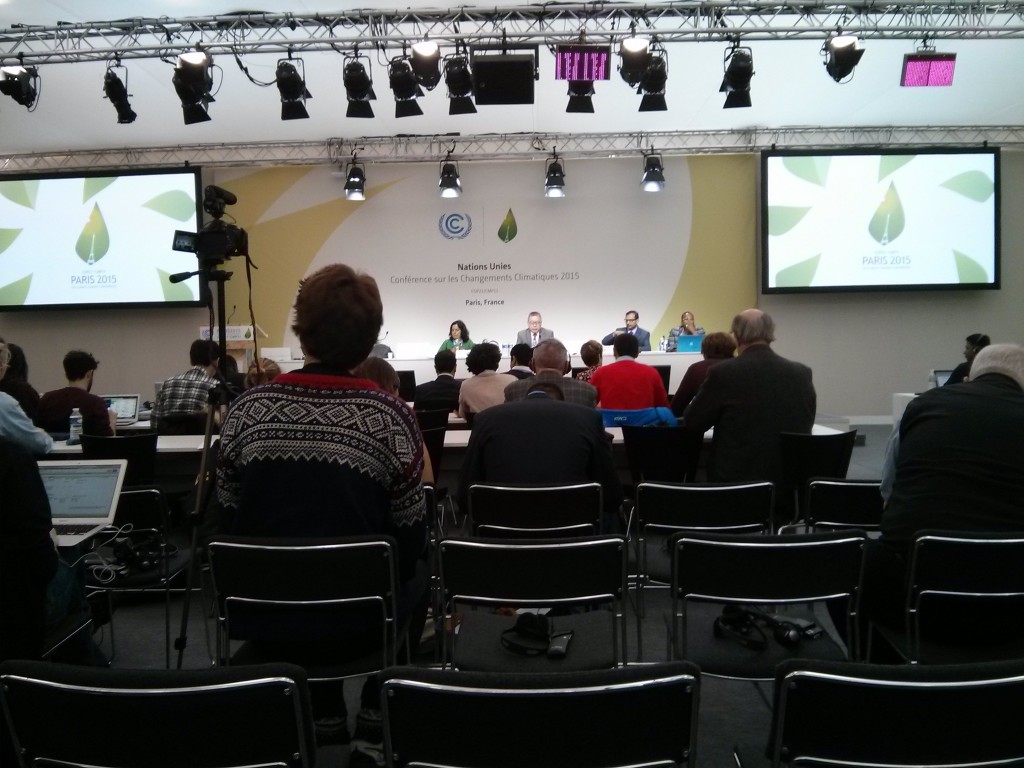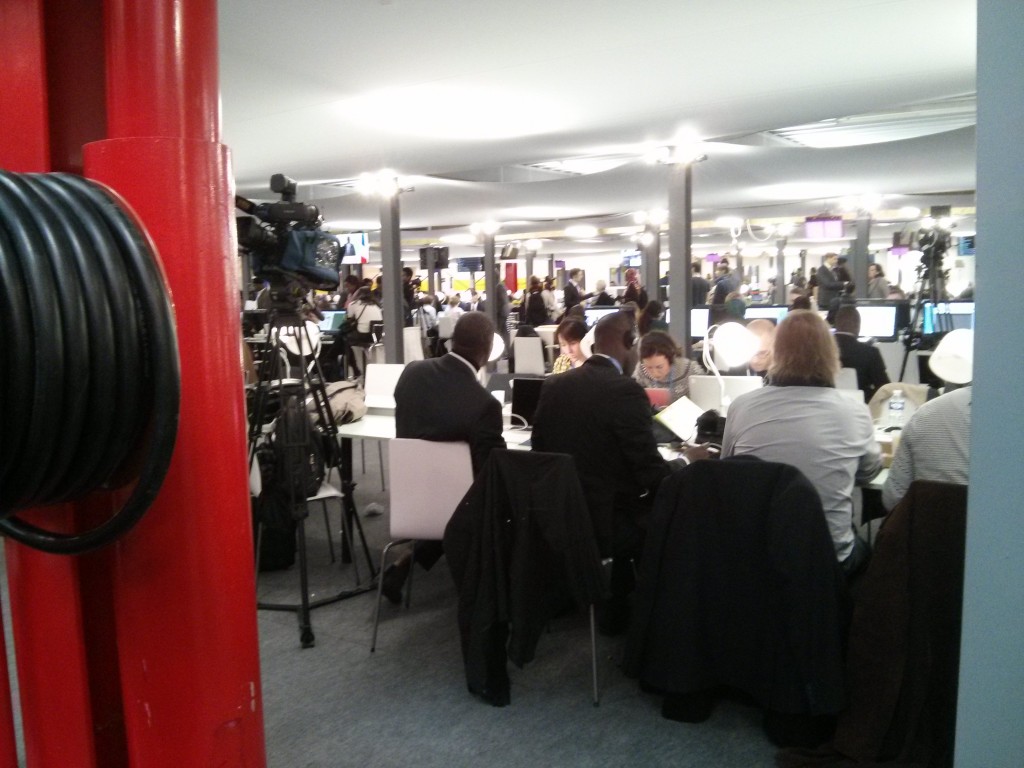The first day of the COP21 started off at full tilt. Signs, graffiti, and artwork highlighting the event paved my way from the airport all the way to Le Bourget. After making a brief cameo at the hostel for a much-needed shower after my red-eye flight, I bolted over to the COP area to get my badge and throw myself in the mix. I got in later than most people since the registration was closed for NGOs this morning, but luckily security took pity on me and I managed to worm my way in just a bit early with enough time to scout around before attending my first side event. I was blown away. As soon as I entered the exhibit hall, scores of delegates from every country you can name flowed past me like schools of fish, weaving their way through the oceans of stands with their multi-colored climate-related flyers, jabbering heatedly to one another in a trifecta of different languages. I passed gigantic rows of tables full of reporters and observers plugged into their computers, all simultaneously plugging away at their Macbooks and watching streams of the Leaders’ event being held in the massive plenary halls across the way. On one hand, it was definitely overwhelming to witness, but at the same time comforting to know that there were so many people invested in the outcome of the COP. After getting my bearings (by which I mean getting lost several times and also getting booted out of the press area), I finally settled down at the first of side events I attended that day, “COP21: The Key Issues”

During the course of this event in which the delegates chairing the panel discussion trickled in and out, I was able to listen to representatives of developing countries including India, China, and the Least Developed Countries (LDCs) voice their thoughts on their own intentions for the COP21, what they believed the key issues on the agenda to be, and the results they wished to see. Each group had a different perspective on how they were approaching the COP, but there was a surprising amount of overlap between these nations especially in regards to the role of developed nations and the issues they viewed to be crucial. All of the parties named adaptation and mitigation strategies to be the most important agenda items for this COP, and called for developed nations to take a bigger role in supplying technology and financial resources to ensures the success of these strategies. Both India and China in particular stood by their usual ground, using the argument of historically generated emissions from developed nations as the case for setting up “Common, But Differentiated Responsibilities” (CBDR) for developing nations and call for technology transfers and other aid to be provided to them by developed countries on this basis. To be honest, I wasn’t surprised.

The next side event I attended was centered on the inclusion of indigenous people in the Reducing Deforestation and Degredation (REDD) mechanisms (http://www.un-redd.org/aboutredd). Traditionally, REDDs are set up in such a way that the indigenous people living on the land may get persecuted for their way of life by the legal boundaries set by the REDDs without reaping any of the benefits which instead go to the governments or NGOs implementing them, bypassing indigenous people as stakeholders in their own cultural lands. The panel for this side event consisted of a coalition Peruvian and Canadian indigenous peoples who laid out suggestions and an alternative framework for ensuring that above all, the territorial and cultural rights of their people were preserved under REDD schemes. This framework stresses the importance of continued stakeholder involvement, proper implementation monitoring among other improvements to the existing REDD mechanisms.

Finally, I attended a side event on the role of civil participation in the Green Climate Fund. Unfortunately, this turned out to be one of the busts of my day, as basically all the panelists really had to say on this matter is that more civil society participation would be good for the GCF in a general sense to offer more feedback, insights, and opinions beyond the ones already there. Given that this would probably happen no matter who they added to the GCF board, I would say that this was sort of a cop-out answer. On the plus side, I did catch an interesting debate about the role of small-scale renewable energy distribution in Indonesia as a potential way of averting some effects of industrialization, and that made me happy in a nerdy sort of way.